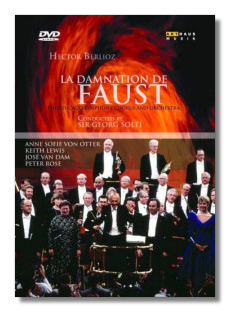
The Internet's Premier Classical Music Source
Related Links
- Berlioz Reviews
- Latest Reviews
- More Reviews
-
By Composer
-
Collections
DVD & Blu-ray
Books
Concert Reviews
Articles/Interviews
Software
Audio
Search Amazon
Recommended Links
Site News
 DVD Review
DVD Review
Hector Berlioz

La Damnation de Faust
- Anne Sofie von Otter (Marguerite)
- Keith Lewis (Faust)
- José van Dam (Méphistophélès)
- Peter Rose (Brander)
Chorus of the Westminster Cathedral
Chicago Symphony Orchestra & Chorus/Georg Solti
Arthaus Musik 102023 DVD 134min Full Screen LPCM Stereo
The supplementary material is not at all forthcoming about it, but this appears to be a performance from 1989 – not from Chicago, but a live "Proms" concert at London's Royal Albert Hall. Also unclear is whether the adult members of the Chorus of the Westminster Cathedral supplemented Margaret Hillis' Chicago Symphony Chorus, or whether the English contribution was limited to the four boys who sing in the Epilogue. At any rate, the chorus is huge; Hillis must have needed semaphore flags to communicate with them during rehearsals. The audience practically spills into the performance area. One feels their presence not just at the end but also in their coughs of disapproval when a few of their fellows have the temerity to applaud in the "wrong" places.
Solti recorded this work for Decca in 1981. The only soloist common to both the CD and the DVD is José van Dam, whose Méphistophélès is solidly sung and suavely contemptuous as only a Méphistophélès in the French tradition can be. His Sérénade is one of this performance's highlights. Lewis is a reserved, bland Faust. I couldn't be made to believe that he was either a tortured intellect or a young man burning with lust for Marguerite, but his attractive and smoothly-produced voice soothed some of that disappointment. (Imagine Stuart Burrows with less personality.) He makes an excellent impression in his "Invocation à la nature," however. The bulk of the vocal kudos must go to von Otter, who spellbinds in her song about the King of Thulé and in "D'amour, l'ardente flamme." She didn't convince me that she was a naïve maiden, though. I guess that's one of the problems of performing such a dramatic work without staging. (Semi-staged performances of La Damnation de Faust are not uncommon, and I believe that there even have been attempts to turn it into an honest-to-God staged opera.) The principals look at each other from time to time, and facial expressions occasionally convey the emotional content of the words and music, but that's about it for acting here.
That the chorus doesn't make more of an impact I blame not on them but either on the microphone placement or on Royal Albert Hall itself. The soloists (all of them amplified, sometimes overbearingly) drown them out easily. Faust's descent into Hell and the demonic chorus of triumph which ensues are too tame. The chorus should play a starring role in this work, and here they have been reduced to supporting players. The orchestra is treated much more kindly by the audio engineers or by the venue. Indeed, they play with the virtuosity which one expects from them.
I thought I'd never say this, but it wouldn't have hurt matters if Solti had pushed the tempos along a little harder. Parts of this performance are sleepy. Even the "Marche hongroise," which I thought would be right up Solti's alley, is not terribly exciting. Even more than on his Decca recording, Solti needs to get beneath the music's skin instead of being content with buffing its surface to a brilliant shine.
The visual aspects of this performance are excellent. (a full-screen format is used.) The English subtitles – not always easy to read - attempt to be as poetic as the French text, but not without missteps! As mentioned above, the sound balance is not ideal, and I had to turn the volume quite far up to get the music to bloom. There's also a bit of hiss and - surprisingly – pre-echo. The audio format is LPCM Stereo only.
Parts of this performance work better than others. The ingenuity and power of Berlioz's music come across loud and clear, however.
Copyright © 2006, Raymond Tuttle




















